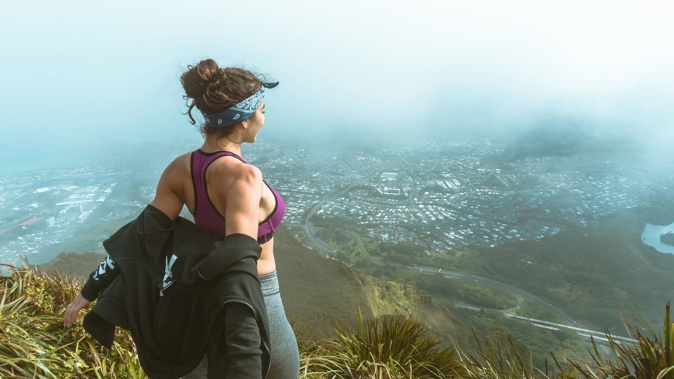
The ‘Stairway to Heaven’ on Ohau has been earmarked for demolition over the bad behaviour of some visitors. Haiku Stairs are set to be removed by the end of April according to Honolulu council, because tourists keep breaking into the off-limits site.
The Haiku stairs are Hawaii’s best known forbidden tourist attraction. Built by the US Navy during the Second World War, they were officially closed to the public in 1987.
However their scenic location has led to hundreds selfie hunters venturing off the beaten track.
The mountain trail in Kaneohe, Oahu is made of 3922 steps and - despite the ban - has been the backdrop to countless Instagram photos and TikTok videos.
 Hawaii's Hiku Steps on Oahu are set to be demolished in a $2.5m project to stop tresspassing tourists. Photo / Darren Lawrence
Hawaii's Hiku Steps on Oahu are set to be demolished in a $2.5m project to stop tresspassing tourists. Photo / Darren Lawrence
It was originally shut to prevent vandalism and littering, with trespassers threatened with a US$1000 ($1690) fine. But the remote location which makes it so beautiful has made it hard to enforce.
Honolulu city council member Esther Kiaʻāina told Hawaii News Now that that “due to rampant illegal trespassing, Haiku Stairs is a significant liability and expense for the city.”
Despite facing a US$1000 fine, tourists have posted thousands of social media photos from the top of Hawaii's Haiku Stairs. Photo / Screenshot
The removal of over 600 sections of stairway is set for the end of the month. The council voted unanimously to address the problem in 2021.
Rick Blangiardi said the work was “long overdue” when he took up office and that it was a decision taken for safety and not to spite tourists. “I can promise you that this was not a capricious decision.”
The mayor spoke during a ho’omaikai’i ceremony last Wednesday to mark the beginning of the removal which the council estimates will cost US$2.6m ($4.4m).
“This decision that was made was predicated upon our respect for the people who live in and around the entrance to the stairs, our respect for our ʻāina, and our respect for both the future and the past history of the culture of the Haʻikū community.”
This article was originally published on the NZ Herald here.
Take your Radio, Podcasts and Music with you









